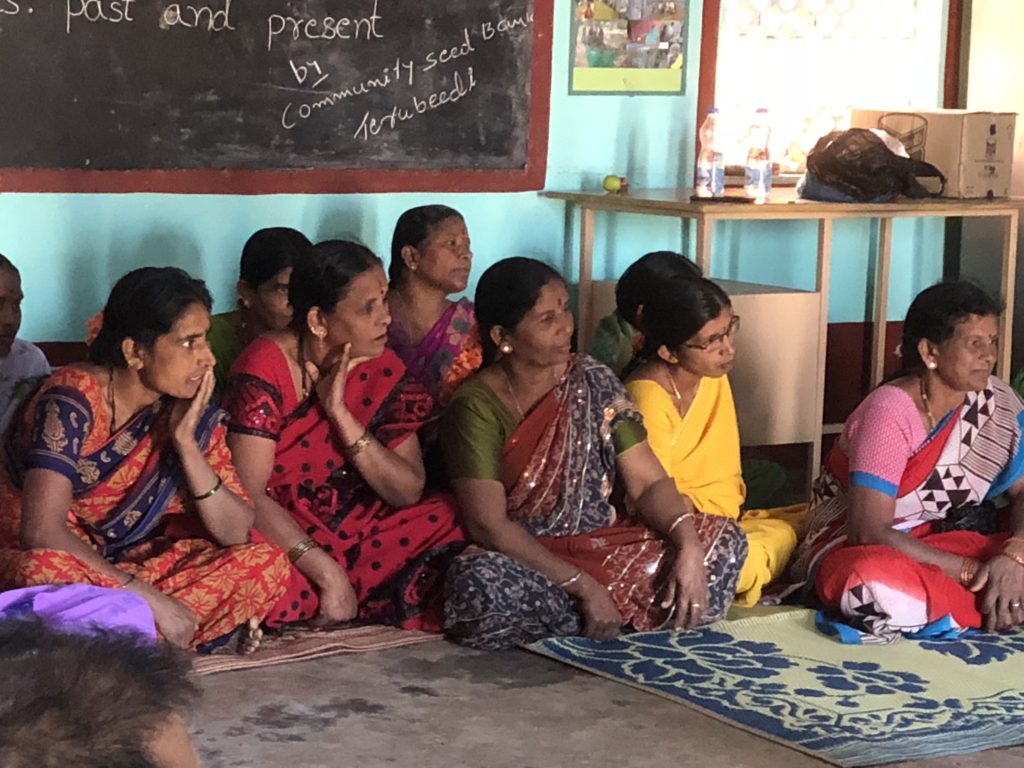Michael Wilson, Professor of Drama at Loughborough University, UK
I am writing this blogpost from Bangalore, where I have spent the last few days participating in a networking workshop on past and present sustainable farming practices. I know very little about sustainable farming practices – I know a little more now than I did at the beginning of the week – but I have been here to talk about storytelling and how it might be used to unlock lay and traditional knowledge and bring new voices into discussions around policy and practice. The event, made possible by a Global Challenges Research Fundgrant from the Arts and Humanities Research Council, has been jointly hosted by the Open University and the Green Foundation, a NGO based in Bangalore that works with farmers (and women in particular) to support the transition to more sustainable and organic forms of crop production. In addition to my own contribution, there were also presentations and discussion around participatory film-making, theatre for development, and oral history.
My argument is (I think) straightforward. I have been researching storytelling for over twenty-five years and for the last decade I have been exploring ways in which storytelling can be applied to policy-making in areas relating to environment, health, education and social justice. I lead a small, but dedicated, team of researchers at Loughborough University, where we have worked on projects in these areas across the UK, Europe and, more recently, East Africa. My background is in theatre and performance, so inevitably our approach is that of storytelling as a performance and social art, whereby we perform our experiences and identities to ourselves and each other. We bring, therefore, an arts and humanities approach to projects that are very broad in their interdisciplinary reach.
“We bring an arts and humanities approach to projects that are very broad in their interdisciplinary reach.”
Our work is based upon four core understandings. First, that storytelling is a universal form of understanding and communicating our experiences and values. It is something we all do and is a vital tool for the effective communication of information on an everyday basis. But storytelling is more than just a vehicle for information – it is also a way of processing and understanding our lives, as well as the social and natural environments within which we operate. In other words, storytelling is its own way of knowing and understanding the world, as well as a way of thinking about it. It is a knowledge and thinking system in its own right.
Second, knowledge systems tend to operate in a hierarchical way and within areas of policy-making, storytelling-knowledge is often at the bottom of that hierarchy, if present at all. More often it is dismissed as anecdotal and unreliable. Instead, those debates are typically dominated by scientific, technocratic and bureaucratic knowledges and discourses, which make those discussions inaccessible to anybody who does not possess those specialist knowledges or the language that accompanies them. In this way, the voices of communities and the lay, experiential, traditional and differently expert knowledges that reside within them, and which are more often than not communicated through storytelling, are excluded. The debates (and the subsequent policies) are all the poorer for it. In particular, ignoring the voices of communities can make the effective implementation of policies problematic.
“[In policy debates], the voices of communities and the lay, experiential, traditional and differently expert knowledges that reside within them, and which are often communicated through storytelling, can be excluded.”
Third, storytelling is not just about reflecting on the past. It is also about responding to the present and planning for the future. For example, in one of our projects we have been using storytelling to help communities understand what the data contained in various future hydrological and climate change scenarios might mean for them.
Fourth, storytelling is a messy business. Storytelling often stands accused of being unreliable and unstable. Stories change, they present different, contradictory truths, they undermine themselves. They are tricksters and shape-shifters, altogether slippery customers. All of this may be true (and the opposite is also true), but we live in an uncertain and unstable, ever-changing world and it is this messy nature of storytelling that makes it such a useful tool for navigating our way through a messy world. Storytelling allows us to test ideas, discriminate between truth and lies and to determine what is useful for addressing a particular dilemma.
“We live in an uncertain and unstable, ever-changing world and it is this messy nature of storytelling that makes it such a useful tool for navigating our way through a messy world.”
Of course, all of this means that the use of storytelling as a tool is unlikely to provide any easy solutions. It is difficult work and will more likely expose contradictions and difficulties, than it will provide solutions to problems. At the same time, though, it can help inform richer, more nuanced, more socially relevant and more community-owned policy-making.
On the second morning of our workshop in Bangalore we were taken out to visit a seed bank, established with the help of the Green Foundation to enable a community of farmers to preserve and grow their stocks of traditional seeds, we were greeted by the village farming community of about two dozen women of all ages. They came dressed in their best saris and they sang for us, told us their stories and even performed a short play they had rehearsed. Their stories were both of their own experiences of farming, but also traditional folk tales (variants of which also exist in Europe), which told of indigenous farming practices. By the time we left we understood much more about them, their lives and the knowledge that helps sustain them.
This research project was funded by a Global Challenges Research Fund grant from the Arts and Humanities Research Council.
